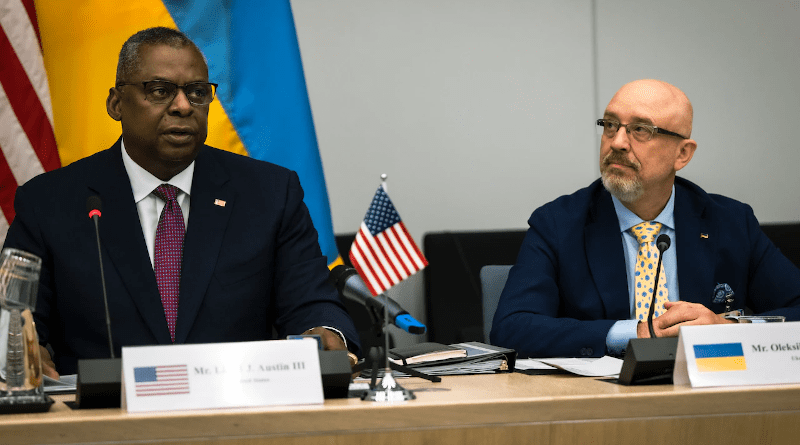Contact Group Meeting Signals Long-Term Support For Ukraine
By DoD News
By Jim Garamone
The meeting of the Ukraine Defense Contact Group Thursday will signal to Russian President Vladimir V. Putin that nations around the world are ready to support Ukraine for the long haul, senior defense officials told reporters traveling with Secretary of Defense Lloyd J. Austin III today.
The United States, its allies and partners have worked tirelessly to provide Ukraine the weapons and training its military needs to defend the country from Russia’s unprovoked attack and take back land lost to the invaders.
The contact group has grown to more than 50 participating members. Austin chairs the group. The group will hear directly from Ukrainian defense leaders.
“We’ve been having conversations over the past couple of months about the urgency of providing what Ukrainians need to defend [their nation], but also, … the capability to take the initiative and to set the terms for the battle and put the Russians back on their heels,” the official said on background.
Ukraine has been successful in pushing back the Russians in the southern part of the country and holding against attacks in the East. They are using not only high-end capabilities, but other asymmetric advantages they have, the official said.
This is the second time the contact group has met since it was founded in April, here at Ramstein Air Base, Germany. The monthly meetings — some in person as and some virtual — allow defense leaders to assess Ukraine’s needs and find capabilities the nation needs. The group also works to provide training for Ukrainian service members on these capabilities.
Now the focus will shift a bit, the official said, as Ukraine and its partners must think not only for today’s battles, but the future. “We’ve been talking to allies or partners about the need to think longer term,” the official said.
That’s because Russia’s Putin is counting on outlasting Ukraine and its allies. The Russian leader did not expect the outrage over the invasion of Ukraine and certainly didn’t expect the solidarity of purpose in supporting Ukraine as it defends its sovereignty. The Russians “didn’t expect the international community in general — and certainly Europe and the United States, specifically — to come to Ukraine’s political, diplomatic, economic and military assistance,” the official said.
Ukraine pushed Russia back from its initial attack on the capital city of Kyiv. The Ukrainian military has held the line in the East. Now they are launching offensives in the south. Putin’s strategy now seems to be to count on the West getting tired of the conflict and becoming distracted, the official said.
“This meeting tomorrow will be an opportunity to signal very clearly that the United States and our partners … are actually in this for the long haul,” the official said.
This is because even if Russia leaves Ukraine tomorrow, there is no guarantee that Putin won’t try another invasion. Ukraine needs to be able to defend its sovereignty, and defense leaders will discuss “opportunities to plus up the defense industrial base, so that it can supply the kinds of capabilities Ukraine needs down the road,” the defense official said. This is more than just ammunition and supplies and basic training. It will include higher level and specialized training.
The contact group is evolving, said another senior defense official. It is focusing on the defense industrial base writ large with investments in sustaining the fight in Ukraine and in ensuring the equipment in Ukraine is maintained and remains capable.
Russia is having problems of its own and has turned to the pariah states of Iran and North Korea for drones and ammunition respectively. “My main takeaway of seeing the Russians needing to go to North Korea and Iran to help them resupply their capabilities is, again, the Russians should not fool themselves that they have greater staying power than Ukraine does,” the official said. ”I think it’s showing that there are cracks in Russia’s capacity to sustain itself, even though it controls and owns the vast majority of the legacy of the Soviet defense industrial base.”
Russia is having trouble in part because the industrial base is weak, but also because of export restrictions and the effect of sanctions on the country, the official said.

